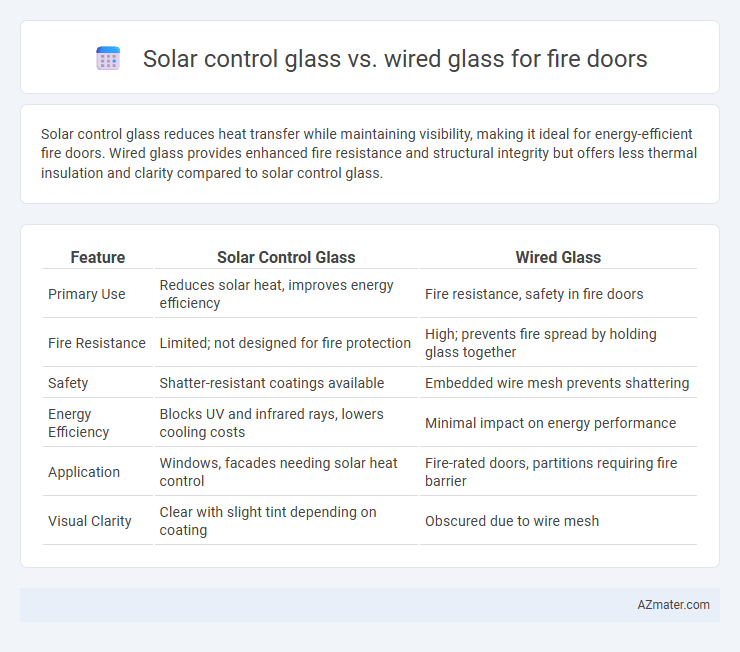Solar control glass reduces heat transfer while maintaining visibility, making it ideal for energy-efficient fire doors. Wired glass provides enhanced fire resistance and structural integrity but offers less thermal insulation and clarity compared to solar control glass.
Table of Comparison
| Feature | Solar Control Glass | Wired Glass |
|---|---|---|
| Primary Use | Reduces solar heat, improves energy efficiency | Fire resistance, safety in fire doors |
| Fire Resistance | Limited; not designed for fire protection | High; prevents fire spread by holding glass together |
| Safety | Shatter-resistant coatings available | Embedded wire mesh prevents shattering |
| Energy Efficiency | Blocks UV and infrared rays, lowers cooling costs | Minimal impact on energy performance |
| Application | Windows, facades needing solar heat control | Fire-rated doors, partitions requiring fire barrier |
| Visual Clarity | Clear with slight tint depending on coating | Obscured due to wire mesh |
Introduction to Fire Door Glazing Options
Fire door glazing options prominently include solar control glass and wired glass, each serving distinct safety and performance needs. Solar control glass enhances energy efficiency by reducing heat transfer while maintaining fire resistance, making it ideal for modern fire doors in commercial settings. Wired glass offers robust fire protection through embedded wire mesh that prevents glass shattering during high temperatures, ensuring compartmentalization and occupant safety in emergency situations.
What is Solar Control Glass?
Solar control glass is designed to reduce heat gain and block harmful UV rays while allowing natural light to pass through, making it an energy-efficient option for fire doors in buildings. This type of glass minimizes solar heat, enhancing indoor comfort and reducing cooling costs without compromising on fire safety standards. In contrast, wired glass incorporates a metal mesh for fire resistance but lacks the energy-saving benefits and clarity of solar control glass.
What is Wired Glass?
Wired glass is a type of fire-resistant glass embedded with a metal wire mesh that maintains its integrity during high temperatures, preventing the spread of flames and smoke through fire doors. Unlike solar control glass, which primarily reduces heat and UV radiation from sunlight, wired glass is engineered to enhance safety by providing fire protection while allowing visibility. It meets stringent fire door regulations and is commonly used where both safety and security from fire are critical.
Fire Resistance Properties Compared
Solar control glass offers enhanced heat reflectivity and can reduce the temperature increase during a fire, but it generally provides lower fire resistance than wired glass. Wired glass contains embedded wire mesh that helps maintain structural integrity by preventing glass shattering under high temperatures, thus offering superior fire resistance for fire doors. Fire door specifications often favor wired glass for compliance with fire codes requiring reliable containment of flames and smoke.
Thermal Performance and Energy Efficiency
Solar control glass significantly outperforms wired glass in thermal performance and energy efficiency due to its low-emissivity coatings that reduce heat transfer and solar heat gain. Wired glass lacks thermal insulation properties, allowing more heat to pass through and causing higher energy loss in fire doors. Choosing solar control glass enhances fire door efficiency by maintaining interior temperature stability and lowering HVAC energy consumption.
Safety and Impact Resistance
Solar control glass enhances fire door safety by reflecting infrared heat while maintaining clear visibility, reducing heat transmission in fire events. Wired glass contains embedded metal mesh, improving fire resistance but often compromising impact resistance due to its brittle nature. For applications demanding both impact resistance and fire protection, solar control glass provides superior performance, offering durability against impacts without sacrificing thermal safety.
Light Transmission and Visual Clarity
Solar control glass for fire doors offers high light transmission rates, typically between 60% and 70%, ensuring excellent visual clarity while reducing solar heat gain. Wired glass contains embedded metal wire mesh that significantly reduces light transmission to around 20%-30% and causes visual distortion, impacting transparency and clarity. The improved optical performance of solar control glass makes it preferable in applications where maintaining natural light and clear visibility is critical without compromising fire-resistance standards.
Aesthetic Considerations for Fire Doors
Solar control glass enhances fire doors with a sleek, modern appearance by reducing glare and heat transmission while maintaining transparency. Wired glass, characterized by its embedded metal mesh, offers a distinctive industrial look but can compromise visual clarity and brightness. Choosing between the two depends on balancing aesthetic preferences with safety requirements, where solar control glass provides a contemporary style without sacrificing fire protection standards.
Cost Comparison and Installation Requirements
Solar control glass for fire doors typically incurs higher upfront costs due to advanced coatings and energy-efficient properties, while wired glass remains more budget-friendly with simpler manufacturing processes. Installation of solar control glass often demands specialized handling and precise sealing techniques to preserve its thermal and solar control features, increasing labor time and costs. Wired glass installation is generally straightforward but may require additional frames or fire-rated supports to meet safety standards, potentially affecting overall expenses.
Choosing the Right Glass for Fire Doors
Selecting the right glass for fire doors involves comparing solar control glass and wired glass based on fire resistance and safety features. Wired glass offers enhanced fire containment through its embedded metal mesh, providing structural integrity during high temperatures, while solar control glass excels at reducing heat transmission and glare but may lack certified fire-resistant properties. Prioritizing fire rating standards and building codes ensures the chosen glass maintains both safety compliance and energy efficiency in fire door applications.

Infographic: Solar control glass vs Wired glass for Fire door
 azmater.com
azmater.com